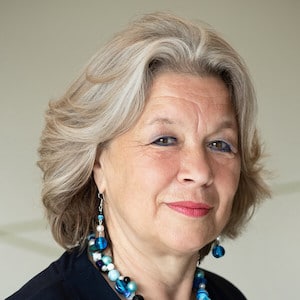Jopie Nooren: ‘Social skills are more important than intelligence’
Jopie Nooren took office in March of this year as chairman of the Executive Board of the Amsterdam University of Applied Sciences (AUAS), as a member of the Board and our Agenda Committee. She is committed to creating an agile and future-proof education and labor market, a topic that is high on the Board's agenda. “As a university of applied sciences, we feel emphatically responsible for Lifelong Development.”
Anyone who thinks that a university of applied sciences does no more than help young people obtain a diploma in four years, can count on a passionate response from Jopie. “That is really an outdated image of our education. The majority of our students are indeed around eighteen years old and have just completed secondary school. In addition, we also have large numbers of students who follow a part-time program or modules, students who follow a master’s program in addition to their job and students who have moved on from secondary vocational education. As a university of applied sciences, we feel emphatically responsible for Lifelong Development and its impact on the labor market. So that’s what we focus our education on.”
Why is it so important that the Board has put creating an agile and future-proof education and labor market on the agenda?
“It is said: we are in a climate crisis and a corona crisis, but there is also a labor market crisis. I think that’s a big word, but it does indicate the urgency that is needed with regard to this theme. The gap between supply and demand in the labor market is huge. At the same time, there are an awful lot of people on the sidelines of the labor market, with all kinds of talents, whom we do not know how to match. Employers still place too much emphasis on candidates’ CVs and work experience, while their skills should be the focus. Someone who comes from tourism could also work in the care sector with the right retraining, as long as employers are prepared to look at someone’s employability in a broader way. And to their current employees: in what other way can they use their (hidden) talents within the organization? We really need a change in our thinking on this theme.
“In addition, we do not realize well enough what is needed in the field of education and the labor market to achieve the intended social objectives. ‘Abolish the use of natural gas’ sounds simple enough, but it means building differently, purchasing differently and therefore training differently. The same applies to digitization, for example: current employees are often not equipped (enough) for this. They graduated twenty or thirty years ago and then went to work somewhere. Now they notice that they lack the knowledge and skills of the future.
“The Board can offer added value in these tasks: they facilitate the collaborations that are really needed within the Amsterdam Metropolitan Area to bring about structural change in both education and the labor market.”
“People often react too late: companies are only prepared to take action once they find themselves in deep water.”
What role does the AUAS play in realizing these changes?
“Some parties believe that getting and keeping people fit for work is a private task. We want our education to be accessible to everyone. With skills-oriented education, we train people for the task of today and tomorrow. The biggest problem is often that people react too late to the developments: companies are only prepared to take action once they find themselves in deep water. Just think of the car industry that has held off the production of electric cars for years, because that required having to produce fundamentally differently. Now they are being overtaken by manufacturers who have adapted their production process much earlier. Many people also only think about their future on the labor market when the letter of resignation from the UWV has arrived.
“That’s why Lifelong Development is such an important concept. Retraining or additional training enables employers to guide their people to a new workplace, often even with the current employer. A good example of this is our Make IT Work program: a five-month retraining program at HBO level, after which you are guaranteed to get a job as an IT professional.
“With our education, we offer people the opportunity to anticipate developments in a timely manner, in a way that suits the individual. For example, in addition to our professionally-qualifying courses, we also offer micro-credentials: recognized proof of learning results from parts of courses. A form of education that fits in well with people who, for example, follow the course while having a job, who need more time due to their home situation or who need only a number of modules within their industry. We are also looking at how we can guarantee Lifelong Development and skills-oriented recruitment in our HR training. We will soon be starting a number of pilots for this.
“Transferring knowledge is no longer the highest good in higher education. Or at least not the only one. For us, knowledge goes hand in hand with personal development and socialization. I think that is a great development: my experience is that social skills are much more decisive for whether you make it in society than purely your intelligence. I therefore argue for more skills-based primary education. How nice would it be if you learned as a child that all your talents are valuable?”
The AUAS is a partner of House of Skills, an official program under the Board since 1 April. What role do you see for this within this theme?
“What House of Skills does – discovering and matching talents – is, as far as I’m concerned, the core of the solution to a future-proof labor market. Do not focus on someone’s CV, but look at which skills someone has developed in his career or in his private life and then move to a new job with additional training. That requires a different way of thinking from both employees and employers. Cooperation from the government is also essential. For example, consider making a training budget available. And to facilitate preconditions such as childcare when you start studying again, or priority to housing in the metropolitan region for people from education, healthcare and the police.”
You have been a Board member for over six months now. What are your experiences so far?
“Recently I have experienced several times what good, useful conversations are held within the Board. I am impressed by the support, great that we have succeeded in bringing so many prominent parties together. I am, however, still looking for ways to translate those good conversations into concrete actions. And how the scope of the Board relates to the many other partnerships in the Metropolitan Region. I hope that in the near future it will be possible to demonstrate the added value of the Board. I think that’s another point of attention. I also sometimes notice tension between the big words in the strategic agenda and the actual approach. While some parties already want three steps forward, others are not yet getting their supporters or processes in gear. A coalition of the willing could help: highlighting what each party wants to commit to and record that, so that we know for sure that we keep moving.”
On Tuesday November 16, TOMAS was launched, a database for companies, governments and talent development initiatives in the Metropolitan Region. What added value do you see in this platform?
“Just like House of Skills, TOMAS revolves around ‘brokering and switching’. On the one hand, we increase the employability of talented people who are unnecessarily sidelined. On the other hand, we are working on sustainable reduction of shortages in certain sectors. I very much welcome that. The platform was developed by the Digital Society School of the AUAS. We are now looking forward to further expanding the platform from the steering group together with the Board and thus contributing to structural talent development in the metropolitan region.”
Tekst: Ronne Theunis
More Board Talk
The interview with Jopie Nooren is part 11 in the Board Talk series. In this series we talk with Board members about the biggest challenges for the Amsterdam metropolis. A region which offers healthy, sustainable living, responsible digitalisation and meaningful work for everyone. These are also the most important themes for the Amsterdam Economic Board. Read more interviews in the Board Talk series.
18 November 2021
Read more about
Contact us
Member Agenda Committee / Chairperson Executive Board
Amsterdam University of Applied Sciences
Want to keep up to date?
Get the best regional news and events (in Dutch) via the Board Update newsletter
Share this news
Want to keep informed?
Follow us daily on LinkedIn and sign up for the Board Update newsletter.
Read more
- Adyen is one of the great success stories of Amsterdam’s tech ...
- Together with enthusiastic partners in three coalitions, the Amsterdam Economic Board is ...
- The top 100 AI tools based in the Amsterdam Metropolitan Area are shown ...


